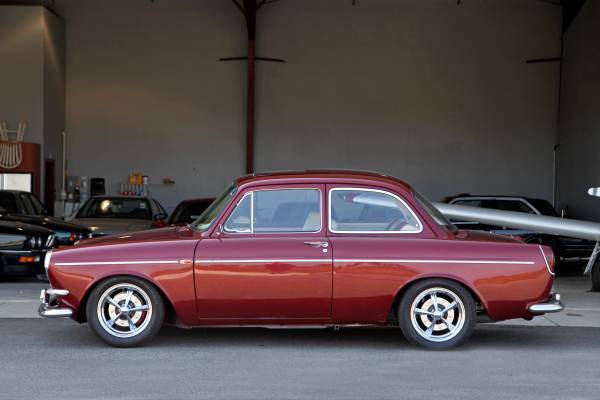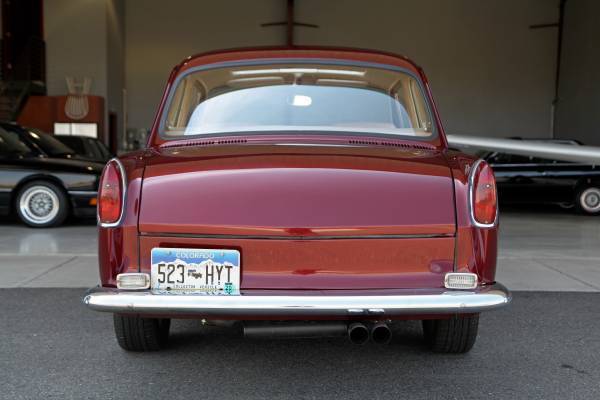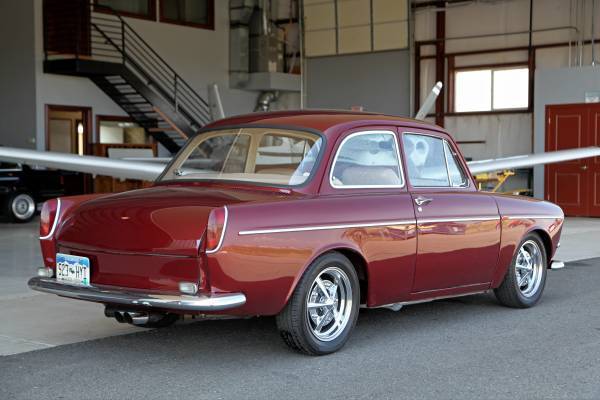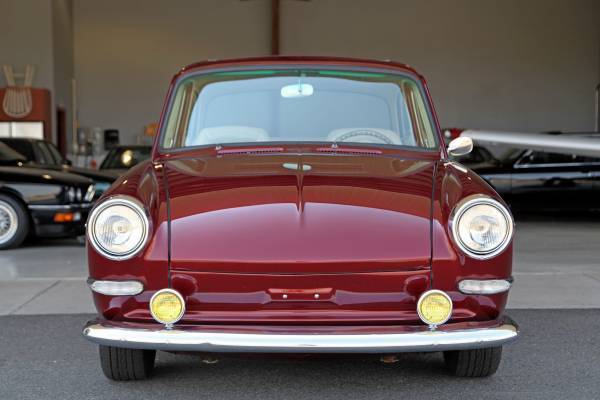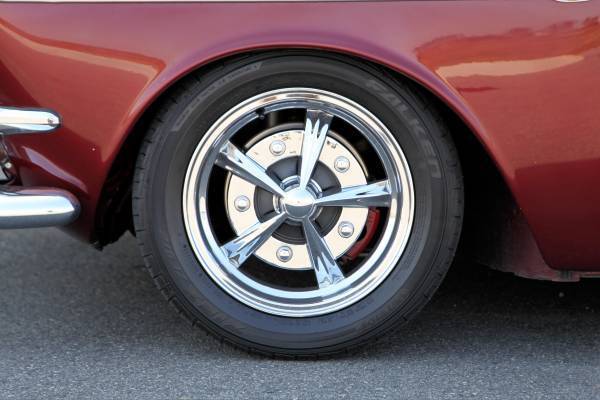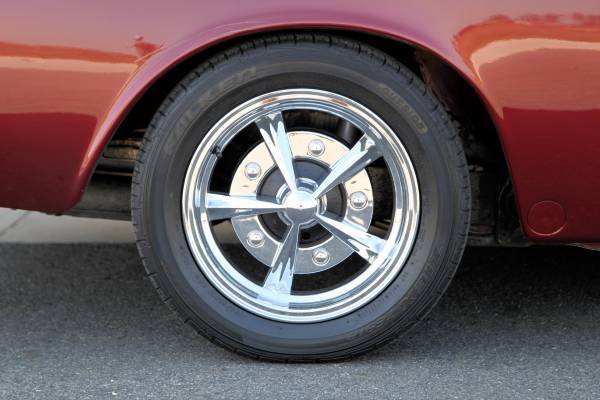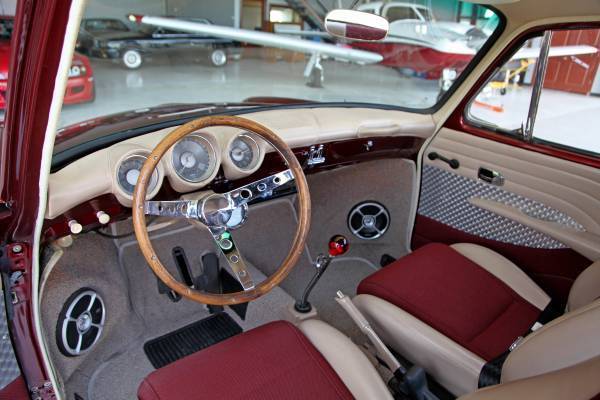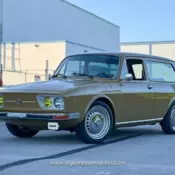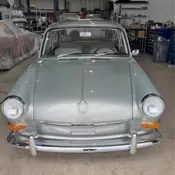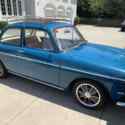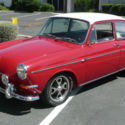1965 Volkswagen Type III Notchback Restoration Show Car
| Make: | Volkswagen |
| Model: | Type III |
| Type: | Coupe |
| Trim: | Notchback |
| Year: | 1965 |
| Mileage: | 6,300 |
| VIN: | 315106599 |
| Color: | Antique Red |
| Engine: | 4-Cylinder 1600CC Twin Carbureted Pancake Engine |
| Cylinders: | 4 |
| Fuel: | Gasoline |
| Transmission: | Manual |
| Drive type: | RWD |
| Interior color: | Beige / Red Cloth |
| Vehicle Title: | Clear |
| Item location: | Denver, Colorado, United States |
1965 Volkswagen Type III Notchback Additional Info:
1965 Volkswagen Type III NotchbackAntique Red Exterior
Beige / Red Cloth Interior
6300 Miles Since Frame-Off Restoration with Rebuilt Motor
Powdercoated Tub and Underbody Components
4-Cylinder 1600CC Twin Carbureted Pancake Engine
Weber 34ICT Carburetors
4-Speed Manual Transmission (recently rebuilt)
Grant 201 Steering Wheel
EMPI Short Shift Kit w/ Long Shift Rod
Front Disc Brakes
EMPI Front and Rear Sway Bars
Stock Lowered Springs with KYB Shocks
15-Inch Chrome Rader Style Wheels
Falken ZIEX ZE912 Tires
Background
If you are a Volkswagen Type III fan, which you probably are if you've found this ad, then you are a member of a community that appreciates the elegant simplicity of an air-cooled VW, yet enjoys the unique design and advancement that the Type III offered over the venerable Type I Beetle. If you are wondering what a Type III is, then let's venture back in time. The year was 1960 and the Geneva Auto Show was filled with buzz that Volkswagen had developed a new model that was larger and more refined than the delightfully utilitarian Type I Beetle. Volkswagen's vehement denials only fueled the fire. When it was released to the European market in 1961 as the 1500 sedan, the Type III lived up to the hype. It was a proper sedan, similar in form to the 3-box designs from still-struggling BMW and domestic powerhouse Mercedes. Unlike these marques, it was affordable and uncluttered with design nuisances like grills--for radiators. That's because, its air-cooled engine was mounted in the rear, but in a newly developed vibration-isolating subframe. In order to provide rear trunk space the upright cooling shroud and fan were moved to the block, creating the "pancake engine" that would later be used in the Type II bus. Shorter gearing, a revised suspension, and a more spacious and luxurious interior further differentiated the Type III from its Type I sibling. The sedan, which became known as the Notchback, was followed by a wagon called the Squareback and a hatchback called the Fastback. When the Type III was released to the US market several years later, it was only offered as the Squareback and Fastback, making the Notchback rare in the States.
Summary
This 1965 German domestic market Notchback found its way to the States in 1967 via a member of the armed services. It was federalized and has lived in Colorado at least since 1999, but likely much longer. I know this because I have a letter from Volkswagen AG dated August 13, 1999 to an owner in Colorado stating that a records specialist reviewed microfiche archives to confirm a build date of January 20, 1965 and delivery to the German domestic market. The current owner, who I am selling it on consignment for, is a long time classic Volkswagen enthusiast who purchased it in 2004 and set about building and restoring it to its current condition. He did a complete frame-off restoration that included a powdercoated frame and underbody, powdercoated engine shrouding, beautiful glass and interior-out paint job, tasteful custom interior, front disc brakes, Rader style chrome wheels, a modern stereo system, and a rebuilt 1600 CC dual carbureted engine and transmission. Since the restoration it has only logged 6300 miles and looks and drives fantastic. It is truly a one of a kind Type III and one of the best examples in the country. The builder describes it as a daily drive-able show car.
Restoration
The restoration began in the spring of 2006 and took nearly five years to complete. I have a two-inch binder filled with receipts totaling over $30,000. The body was removed from the frame and both were media blasted to bare metal. Any rust or filler was removed and replaced with fresh metal. The chassis, floor pans, and underbody components were completely disassembled and powdercoated. A new wiring harness was installed. All brake and fuel lines, cables, grommets and trim pieces were replaced with fresh components. A new steering box was installed. The front brakes were converted to disc brakes, the rear drum brakes were replaced, and KYB shocks were installed along with fresh wheel bearings. EMPI front and rear sway bars were installed. Rader style chrome wheels with fresh rubber were mounted. The glass and interior were removed from the body for painting, which cost over $8000 including preparation. The VW badge perches were shaved at this time. All body seals, trim, chrome-work, and light lenses were replaced. Inside, the interior was completely refinished including carpet, seats, door panels, headliner, and a Type III dashboard with replacement gauges. The odometer was set to zero at this time. All interior seals were replaced and in the process, Dynamat sound deadening was installed. A Grant 201 steering wheel was installed along with an EMPI shifter. The motor was completely rebuilt with a 1600 CC block and rebuilt Weber 34ICT carburetors. Final assembly was completed in the fall of 2010. In March of this year the transaxle was rebuilt. Over the course of the restoration virtually every mechanical, electrical, and cosmetic component was replaced. I have a spreadsheet summary of all receipts that I can share via email and will provide those digital copies on request.
Impressions
At rest the Notchback has an elegant simplicity that is lacking in over-styled modern cars and even the more gaudy designs from the 1960s. Its 3-box design is smoothed by rounded edges. Antique red is a dynamic hue that is warm and metallic in direct sunlight. In the shade it transforms to a deep and rich burgundy. At sunset it is almost iridescent--almost. Yellow fog lights over chrome accents suit it perfectly. Open the door and the light airy feel of all classic Volkswagens greets you. Matching two-tone beige and burgundy fabric under Karman seat belt buckles look factory-spec. Brushed diamond plated accent panels and a leather wrapped dashboard are the only clues that the interior is custom. The wooden steering wheel in front of three gauges is tidy. A modern tachometer is tucked discretely below the steering column. The EMPI shifter and custom shift knob are clues to the larger 1600 CC engine. The 1600 CC block wasn't offered until later 1965 build dates, but it is a nice upgrade. Those extra CCs breathing through dual carburetors make this Notchback decently fast by air-cooled VW standards, but that's not why you drive this car. Air-cooled Volkswagens have a unique charm that can only be experienced from behind the wheel. Unlike some classics, this Notchback can be driven regularly without hating it. It is easy to see out of, easy to drive, and very comfortable. In simple terms, it is just right.
Exterior
I strive to give critical descriptions of our cars, good and bad. Overall the exterior of this car is in exceptional condition. The paint presents as you would expect, given the recent restoration. It is a high quality paint job that has withstood the years and mileage since the restoration. There is no excessive orange peel, no failed clearcoat, and no glaring defects. There are no dents or door dings. Close examination does reveal a few very small rock chips, a few small scratches, and some cracking in the left rear fender. The latter was caused when an old lady bumped the left rear bumper at very slow speed. Slower than walking speed according to the man that witnessed it. The bumper shows no indication of contact, but it did cause some minor cracks in the rear quarter finish. The largest scratch is on the trunk lid, about 5 inches long. It isn't glaring, but worth noting. Underneath, the powdercoated chassis looks great and is absolutely rust free. All trim is intact and in excellent condition. All glass is in excellent shape and surrounded by very nice rubber. The windshield wipers are shaved, but the studs are still present. They would need to be re-threaded to install new wipers (not an easy task). All sunroof hardware was replaced in the restoration, but it doesn't quite seal in the front. It stops about ¼" from full forward. I am getting a quote on what this repair would cost. The antenna has been shaved, but could be replaced with a modern hidden unit. The Rader style wheels are in excellent condition with no bends or curbrash. The tires are worn evenly with 60% tread remaining.
Interior
Like the exterior, the interior is nearly flawless. There are no odors and it has never been smoked in. Tan carpets cover the entire floor and are in excellent shape with no rips, tears, or stains, sans one very faint area of discoloration on the rear floor behind the driver's seat. The seat fabric is in excellent shape with no failed stitching, tears, or stains. The Karman seatbelt buckles look great. The wooden Grant 201 steering wheel has some patina, but it looks great. The horn works by either pressing the button or pushing hard at three and nine o'clock on the steering wheel--the latter of which is not an intended design feature. The leather wrapped dashboard looks factory and has no cracks or failed stitching. All gauges work except for the clock, which is just part of the genuine VW experience! The tachometer is a very nice touch, as are the EMPI shifter and custom shift knob. The painted areas of the lower dashboard, along with all exposed interior metal match the exterior finish perfectly. The stereo system sounds excellent. A custom sub box and amps are concealed under the rear deck lid behind the trunk carpet. The radio portion of the stereo has no antenna, but a modern unit could be discreetly retrofitted cheaply. The front and rear trunks are exceptionally clean and fitted with all period correct accessories including a spare tire with rubber from the Nixon administration. The fuel and oil filler caps were left original as clues to the car's heritage and have a very nice patina.
Mechanical
The great thing about a complete restoration is that nearly every mechanical component has been replaced. To start the 1600 CC engine you place your foot on the gas pedal, crank, and it fires quickly. Click the ignition switch from start back to on and you are on your way. The engine idles smoothly and pulls strong to its redline--which is marked slightly less than the factory 4500 RPM on the tachometer. The owner never revved past 4000 RPM to preserve engine life. The clutch take up and shifter are crisp and precise and the brakes are firm. The left side exhaust pipes of the quad exhaust system departed the muffler at some point, but I actually prefer the single dual pipes. It doesn't hurt the functionality. There is a very slight oil leak under the center of the engine if it sits over time. I have not identified the source yet, but it is not a significant leak.
We would like to find a new owner for this Notchback who will continue to care for it and enjoy it for years to come. Like any classic Volkswagen it will certainly need continued care and maintenance, but it deserves it.
Glen Shelly is a low volume auto brokerage focused only on the highest quality vehicles. We are two airline pilots, mechanics, and auto enthusiasts who bring a high level of professionalism and attention to detail to the automobile business. Our philosophy is to keep our inventory small so that we can focus on thorough mechanical and cosmetic preparation of the vehicles we select. We have over 20 years of experience restoring and repairing automobiles and are intimately familiar with our cars. We do the inspections, service, detailing, and corrective maintenance using only OEM parts and service manuals. We offer an informed and low-pressure sales environment resulting in a premium buying experience. See our listing for thisvehicle athttp://glenshelly.com/sales/1965-volkswagen-typeiii-notchback.

